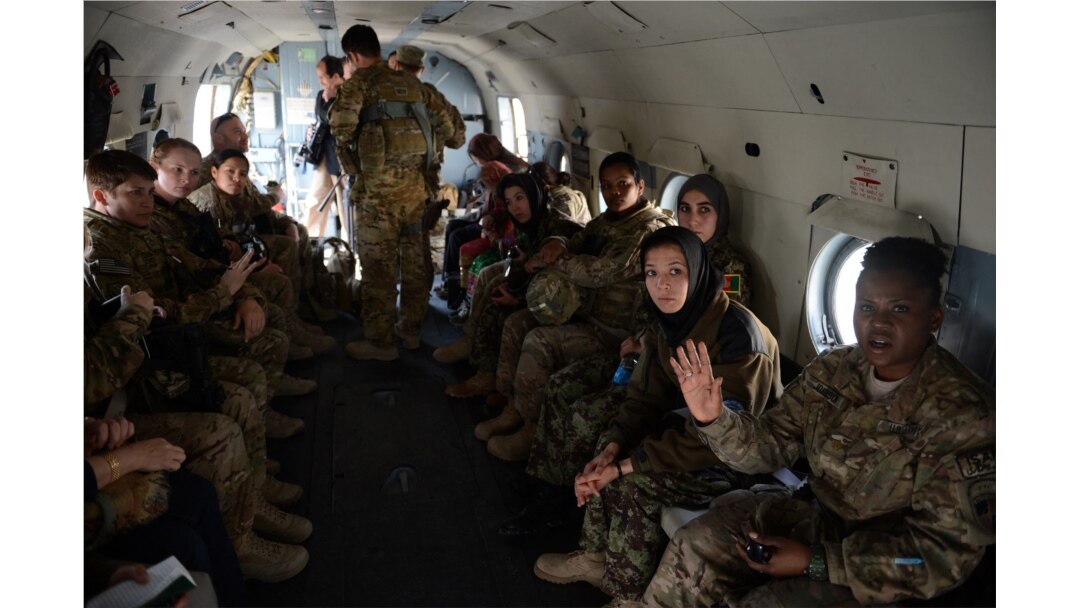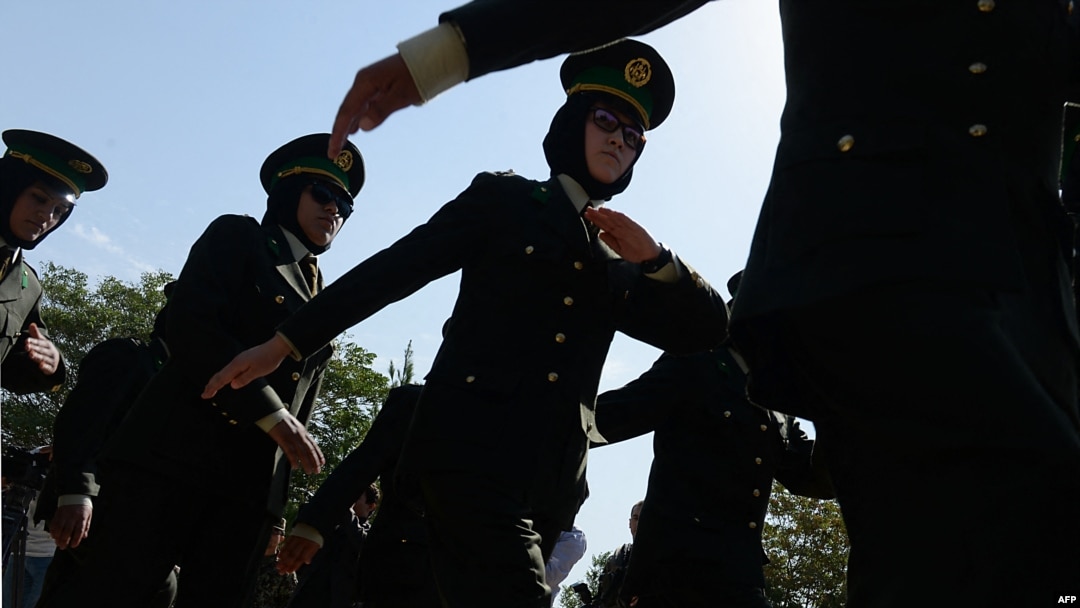Afghan women who served in the country's military are speaking out about how their life has changed under the Taliban.
"I feel like I am in prison," said Jamila, 28, a former Afghan military officer in the western city of Herat. "I have to be at home. I can't work or go out. I am so afraid."
More than 6,300 women served in the former Afghan National Defense and Security Forces (ANDSF). Now they face not only threats to their life as former members of the military but also the Taliban's imposed restrictions on their gender.
"We have no hope that things would change. I do not think that Afghan military women have any future under the Taliban," said Jamila, who did not want her real name to be revealed for fear of reprisals.

FILE - Afghan women and International Security Assistance Force female soldiers sit inside a helicopter for a ride with the Afghan Air Force at the Kabul International Airport, in Kabul, March 7, 2013.
The Taliban, who seized power after the Afghan government collapsed on August 15, have imposed repressive rules on women, including banning women from work, secondary education, and long-distance travel.
Human Rights Watch and the United Nations accused the Taliban in November of the summary killing of more than 100 former Afghan security officials despite the group's promise of general amnesty.
Jamila served for 10 years in the 207th Zafar (Victory) Corps of the Afghan National Army, headquartered in Herat province. She says she now hears news every day of someone else who was killed or disappeared.
"I fear that they (the Taliban) might find me and kill me," she said.
Despite assurances from senior Taliban leaders that the group plans no retribution killings, Jamila said their word cannot be trusted.

FILE - Female Afghan National Police (ANP) march during a graduation ceremony at a police training center in Herat, Dec. 20, 2012.
The more than 6,300 women who served as security forces were a small fraction of the country's 300,000-strong force, but their careers represented a significant cultural shift for the conservative country.
Washington's Special Inspector General for Afghanistan Reconstruction, or SIGAR, reported in July that 4,253 women served in the police, 1,913 in the army and 146 in the air force.
Living in fear
Now, some of them are on the run.
"We have been moving from one place to another to avoid being identified," Jamila said.
Serving in the Afghan military was always a significant risk for the women, whose families sometimes opposed their work.
"Despite the enormous obstacles," said a SIGAR report in February 2021, Afghan women continued to join ANDSF "often at a great personal risk."
Jamila, a mother of two, said that her family had opposed her joining the army. And, she said, they blame her for the hardships they now face.
"They are telling me that you joined the army and that is why our lives are in danger."
Before the fall of Kabul to the Taliban, many women, government employees and social activists were killed in targeted attacks.
Your browser doesn’t support HTML5
14 Women Killed in Targeted Attacks Since January in Afghanistan, Says Afghan Rights Commission
Of the seven Afghan women who were posthumously given the U.S. State Department's 2021 International Women of Courage Award, three were working with Afghan security agencies.
A U.S. State Department press release issued in March 2021 stated that honorary awards were given "to seven leaders and activists from Afghanistan who were assassinated for their dedication to improving the lives of Afghans."
Jamila said that after the Taliban takeover, some of her colleagues had escaped to Pakistan and Iran, but most of them remain in Afghanistan, living in fear.
"The majority could not flee because they do not have money (or) passport, or (are) having other problems," Jamila added.
'We fought them'
"I had no choice but to escape to Pakistan," said a former Afghan army officer, 25, who did not want her identity to be disclosed for safety reasons.
The former officer, who was also posted in the Zafar Corps in Herat, said that she had to escape just after the fall of the city into the Taliban's hands. "I went together with a family of my relatives and crossed to Pakistan."
She said that most of the women who had served in the military in her province were in danger since "we fought them. They wanted to kill us, and we wanted to kill them."
FILE - Female soldiers of the Afghan Air Force wait at the International Airport in Kabul, March 7, 2013.
She does not see any future for her fellow female veterans in Afghanistan, she said. "Forget about the idea that they will let us go to work. They do not even let girls go to school. They do not accept women to be part of the society."
The Taliban's position on women's rights had not changed from what she had heard about the group's repressive rules in the 1990s, she added.
Under the Taliban, in the late '90s, women were denied education and employment. The militant group also forced women to cover themselves from head to toe and prevented women from leaving their houses without a male companion.
After the fall of the Taliban in 2001, Afghan women made some achievements. About 3.5 million girls were going to schools. About 30 percent of the civil servants and around 28 percent of parliamentarians were women.
Afghan women's rights activists worldwide have been protesting the Taliban takeover, which has curbed the rights and freedoms that Afghan women achieved over the past 20 years.
On Tuesday, dozens of women took to the streets of Kabul, demanding work, food and education.
SEE ALSO: Witnesses: Taliban Fire Warning Shots on Afghan Female ProtestersCall for help
"No one cares about us right now," said the former army officer, adding that "NATO was supporting us. We were encouraged to join the army, but now we are forgotten."
She called on the international community to help relocate those women whose lives are at risk under the Taliban.
Hosna Jalil, Afghanistan's former deputy minister for women affairs who also served as deputy interior minister from December 2018 to January 2021, said that Afghan women who were working in the security sector are at great risk.
"Women (in the security sector), because their number was low and they can be identified easily, I think they are more vulnerable," she said.
Initiatives are underway to relocate some of the former Afghan military women to a safer place, Jalil said, "but the process, to tell you honestly, is very scattered and slow."
"And this is the reason that we lose them one by one," Jalil said, referring to the targeted killings of former Afghan military personnel.


